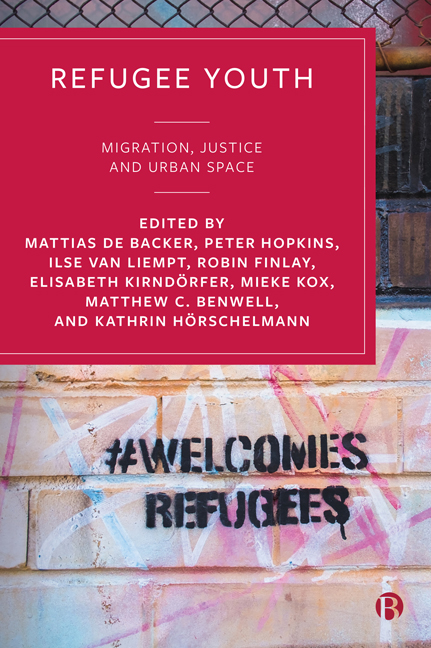Book contents
- Frontmatter
- Contents
- List of Figures and Tables
- Notes on Contributors
- Acknowledgements
- 1 Introducing Refugee Youth: Migration, Justice and Urban Space
- 2 Storying Belonging, Enacting Citizenship? (Dis)articulations of Belonging in a Community Theatre Project with Young Refugees and Asylum Seekers in Leipzig, Germany
- 3 Jackets and Jewellery: Racialised Dispossession and Struggles over Public Space in Denmark
- 4 Venezuelan Refugee Youth and Brazilian Schooling: The Individual between Languages and Spaces
- 5 The Inclusionary Potential and Spatial Boundaries of (Semi-)Public Space: Refugee Youth’s Everyday Experiences in the Urban Fabric of Amsterdam
- 6 Navigating ‘Purdah’ Culture in Urban Space: The Restricted Lives of Young Married Rohingya Refugees in Malaysia
- 7 Inclusive Urban Planning and Public Space for Refugee Youth in Pursuit of a Just City in Amman, Jordan
- 8 Sense of Belonging among Tibetan Refugees in India: A Case Study of the Bylakuppe Settlement in Karnataka, India
- 9 Negotiating Identity in Urban Space: Everyday Geographies of Syrian Students in Istanbul
- 10 ‘You’re Judged a Lot’: Australian Sudanese and South Sudanese Youths’ Perspectives on Their Experiences in Public Spaces
- 11 Hair Salons as ‘Private-Public Spaces’: Exploring the Experiences of Young Migrant Women in an Urban Township in South Africa
- 12 Emotion and Spatial Belonging: Exploring Young Migrant Men’s Emotional Geographies in Cork, Ireland
- 13 Homemaking through Music in Urban Africa: Creating Opportunities as a Refugee and a Migrant in Kinshasa and Dar es Salaam
- 14 Planetary Listening
- 15 Refugee Youth: Politics, Publicness and Visibility
- Index
3 - Jackets and Jewellery: Racialised Dispossession and Struggles over Public Space in Denmark
Published online by Cambridge University Press: 18 January 2024
- Frontmatter
- Contents
- List of Figures and Tables
- Notes on Contributors
- Acknowledgements
- 1 Introducing Refugee Youth: Migration, Justice and Urban Space
- 2 Storying Belonging, Enacting Citizenship? (Dis)articulations of Belonging in a Community Theatre Project with Young Refugees and Asylum Seekers in Leipzig, Germany
- 3 Jackets and Jewellery: Racialised Dispossession and Struggles over Public Space in Denmark
- 4 Venezuelan Refugee Youth and Brazilian Schooling: The Individual between Languages and Spaces
- 5 The Inclusionary Potential and Spatial Boundaries of (Semi-)Public Space: Refugee Youth’s Everyday Experiences in the Urban Fabric of Amsterdam
- 6 Navigating ‘Purdah’ Culture in Urban Space: The Restricted Lives of Young Married Rohingya Refugees in Malaysia
- 7 Inclusive Urban Planning and Public Space for Refugee Youth in Pursuit of a Just City in Amman, Jordan
- 8 Sense of Belonging among Tibetan Refugees in India: A Case Study of the Bylakuppe Settlement in Karnataka, India
- 9 Negotiating Identity in Urban Space: Everyday Geographies of Syrian Students in Istanbul
- 10 ‘You’re Judged a Lot’: Australian Sudanese and South Sudanese Youths’ Perspectives on Their Experiences in Public Spaces
- 11 Hair Salons as ‘Private-Public Spaces’: Exploring the Experiences of Young Migrant Women in an Urban Township in South Africa
- 12 Emotion and Spatial Belonging: Exploring Young Migrant Men’s Emotional Geographies in Cork, Ireland
- 13 Homemaking through Music in Urban Africa: Creating Opportunities as a Refugee and a Migrant in Kinshasa and Dar es Salaam
- 14 Planetary Listening
- 15 Refugee Youth: Politics, Publicness and Visibility
- Index
Summary
Introduction
During the late summer and fall of 2020, the Danish Prime Minister, Mette Frederiksen, repeatedly claimed that groups of so-called ‘indvandrerdrenge’ (immigrant boys) were creating public insecurity. According to Frederiksen, ‘indvandrerdrenge’ were hanging out in groups along sidewalks, on public transportation and in neighbourhood parking lots and public squares, where their (supposedly) inappropriate behaviour was making others feel unsafe. In response, Frederiksen and her government proposed to provide the police with a new authority to break up these groups of ‘indvandrerdrenge’, fine them and confiscate their ‘expensive jackets, watches and mobile phones’ (Frederiksen, 2020, translation by author).
In this chapter, I examine this imperative to remove so-called ‘indvandrerdrenge’ from public spaces and confiscate their personal belongings. The literal translation of the term ‘indvandrerdrenge’ in English is ‘immigrant boys’. Yet, within the contemporary Danish context, this term is far from neutral. As a compound term of ‘immigrant’ and ‘boy’, ‘indvandrerdrenge’ conjures a specific racialised demographic of male youth or young adults. Referring to this group as ‘boys’ relies on an unsubtle paternalism, framing this group as lacking adult characteristics. Furthermore, rather than immigrants per se, ‘indvandrerdrenge’ refers to young ‘non-western’ immigrants or young men whose parents or grandparents have immigrated from so-called ‘non-western’ countries. These associations are tied to growing attempts by the Danish state to collect data testifying to the existence of this new social category. Since 2002, the national statistical agency, Statistics Denmark, has recorded statistical information about indvandrer (immigrants) and efterkommer (their descendants) living in Denmark. Statistics Denmark classifies immigrants and their descendants according to two categories: ‘western’ and ‘non-western’. Western countries include the member states of the EU (including the UK), Andorra, Iceland, Liechtenstein, Monaco, Norway, San Marino, Switzerland, Vatican City, Canada, the United States, Australia and New Zealand. The rest of the world's 156 countries are defined as ‘non-western’ countries.
This categorisation enables politicians, journalists and social scientists to refer to ‘non-western’ immigrants and their descendants – people from over 150 different countries – as ‘a somewhat monolithic object of governmental intervention and social scientific inquiry’ (Zhang, 2020).
- Type
- Chapter
- Information
- Refugee YouthMigration, Justice and Urban Space, pp. 32 - 47Publisher: Bristol University PressPrint publication year: 2023



